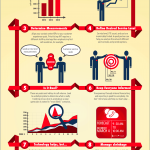Four Myths Most Bosses Believe About Employee Engagement
Engaged employees are more productive, have higher job satisfaction, and are more focused on customers, according to a Gallup study. But what exactly does “engaged” mean?
Boston University professor William Kahn coined the term 25 years ago, but there still isn’t a widely accepted definition. What does exist, however, is a lot of frustration and myths surrounding the idea, says Rodd Wagner, vice president of employee engagement strategy for the consulting firm BI Worldwide and author of Widgets: The 12 New Rules for Managing Your Employees As If They’re Real People.
“Once in a while, you will hear someone say he’s ‘engaged’ or ‘disengaged’ at work, but not often,” he says. “Even after two decades of HR using it, it’s not part of the natural vocabulary among employees and, it’s now safe to say, it never will be.”
The problem goes to the core of the relationship between the employee and the company, Wagner says. “Employee engagement is what the business wants; it’s strategic with a return-on-investment view,” he says. “Happiness is what the employees want. If they each look out for the other’s interest, the bargain works exceptionally well. It’s human nature to reciprocate what we do for others.”
Whether you strive for engagement or happiness, Wagner says there are four myths that leaders need to know:
Myth 1: There’s No Proof That Happy Employees Will Do Anything Great For Your Company
Happiness is associated with hard work, says Wagner. Nine out of 10 happy employees agree with this statement: “I feel an obligation to work as hard as I can for my organization,” while just six out of 10 unhappy employees agrees with the same statement, according to a study from BI Worldwide.
The study also found that 93% of happy employees agree with the statement, “I am willing to work especially hard for my organization’s customers,” compared to just 69% of unhappy employees.
Myth 2: Somebody Can Be Happy At Work, But Not “Engaged”
While Wagner says technically this could be true; in practice it’s not. The overlap between those who are happy and those who are engaged is so large that there aren’t appreciable numbers of people who are happy at work and not engaged, or, conversely, engaged and not happy, according to the BI Worldwide study.
“In the vast majority of cases, engaged employees are happy, and happy employees are engaged,” he says.
Myth 3: Measuring Job Happiness Levels Isn’t Enough To Retain Star Performers And Build A Successful Business
More than half of unhappy employees plan to leave in the next 12 months, while just 23% of those who are happy at their current jobs plan to leave, according to BI Worldwide.
“Engagement and satisfaction are different aspects, but deep in the fine print the research overlaps making them statistically identical,” says Wagner. “If you ask someone if they’re satisfied at work and then if they’re engaged at work, you’ll see a furrowed brow. They’re the same.”
Myth 4: Employees Might Be Happy Because They Are Lazy
Leaders often believe that employees are happy because they’re talking to their work friends, enjoying the free cafeteria food, and driving the company car. But this kind of “happiness” doesn’t equate to working hard on behalf of the company.
“This is a terrible assumption about human nature from the anti-happiness crowd,” says Wagner. “They have a picture of a happy employee sitting on the back porch with their feet up reading magazine for 40 hours a week. The ‘pursuit of happiness’ as Jefferson wrote it into the Declaration of Independence is not a hedonic sleeping in; it’s a purpose-driven happiness.”
In proper conditions people like to work, whether that’s building airplanes or running a hotel, and most want to make a greater contribution as long as they’re not being yelled at and stressed out, says Wagner.
While there are bad employees who will try to get away with doing as little as possible, they are rare. “We shouldn’t build the rules of an organization around the worst employees,” he says. “There’s a misguided belief that if you spoil people, they’ll play hooky. It’s just a really terrible assumption and there’s an insult built in there; ‘You can’t be trusted to work hard if we don’t watch you.’”
One of the advantages of concentrating on happiness at work is that it needs no definition. “Ask someone, ‘Are you engaged at work?’ and you may well get the question, ‘What do you mean?’” says Wagner. “Ask someone, ‘Are you happy at work?’ and you will get a real answer. No one ever says, ‘What do you mean by ‘happy?’”
Fast Company , Read Full Story
(85)














